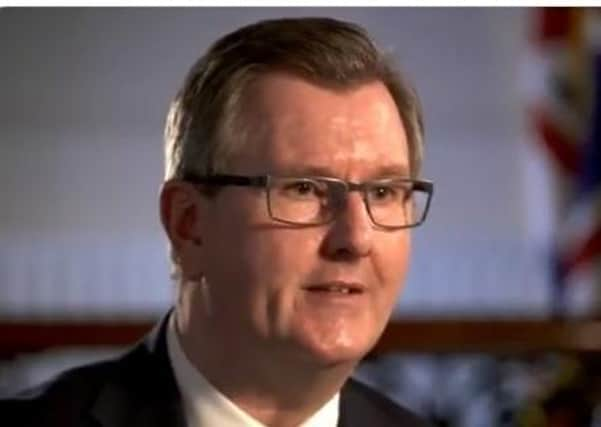Owen Polley: Now even the DUP party seems prepared to go along with ‘best of both worlds’ hokum about Northern Ireland post Brexit


Regrettably, the top Brexit negotiator’s fry-up didn’t include potato bread or soda farls, because no part of the UK will be more anxious than Northern Ireland that his endeavours are successful.
Worryingly, as the government published its ‘approach to negotiations’ last week, there was no reference to neutralising the protocol that threatens to create an internal-UK border down the Irish Sea.
Advertisement
Hide AdAdvertisement
Hide AdIndeed, the document contained a promise to walk away from talks in June, unless the ‘broad outline’ of a trade deal is already in place.
That will give the government time to ‘focus solely on continuing domestic preparations to exit the transition period in an orderly fashion’.
To you or me, that means they will be getting ready for a possible no-deal outcome, and it could easily include preparing infrastructure to carry out checks at Irish Sea ports.
This seeming acceptance of the Northern Ireland protocol is at odds with Boris Johnson’s rhetoric about ‘unfettered access’ between all parts of the UK market.
Advertisement
Hide AdAdvertisement
Hide AdAnd it doesn’t tally with reports that the prime minister has instructed his Brexit team to draw up plans to avoid implementing checks on goods moving from Great Britain to NI.
The EU certainly believes that Johnson must start erecting a border in the Irish Sea. Michel Barnier described checks between the mainland and Northern Ireland as an ‘indispensable’ element of the Withdrawal Agreement.
That document effectively requires Northern Ireland to remain in the single market, for goods and agriculture at least, as the rest of the country leaves at the end of the year.
In addition, we must continue to apply the EU customs code and, by default, that means businesses here paying up-front tariffs on goods they bring in from Great Britain for processing.
Advertisement
Hide AdAdvertisement
Hide AdExtraordinarily, the DUP’s Jeffrey Donaldson told the BBC this week that customs checks could represent an ‘opportunity’ for businesses in Northern Ireland. He dismissed the notion that a customs border has implications for British sovereignty here. Now, even the biggest unionist party seems prepared to go along with this ‘best of both worlds’ hokum.
In fact, although the protocol may seem rather technical, it’s likely to affect every single person living here.
This week, The Telegraph’s Brexit Bulletin reported that a major supermarket estimates that the price of ferrying a trailer of groceries to Northern Ireland could go up by 50%, or £6,000 per consignment, thanks to potential new administration and veterinary costs. It’s inconceivable that such drastic price rises will not be passed on to consumers.
The government continues to deny that the protocol will have such drastic consequences.
Advertisement
Hide AdAdvertisement
Hide AdThe new secretary of state, Brandon Lewis, claims, “there will not be a border down the Irish Sea, there will be unfettered access for business”, while a Downing Street statement asserts there will be “limited changes” to trade between GB and NI.
In the House of Lords, Treasury minister, Lord Agnew, told Lord Empey that some “light touch regulation” may be needed.
All these terms — ‘unfettered access’, ‘limited changes’ and ‘light-touch regulation’ — are vague enough to allow the government to simply downplay the scale of any disruption rather than prevent it.
Meanwhile, The Sunday Times, reports that a senior Downing Street source says “there is deadly serious internal work going on about not obeying the Northern Ireland protocol”.
Advertisement
Hide AdAdvertisement
Hide AdThe implication is that Johnson knows fine well that the Withdrawal Agreement includes checks on goods, an internal-UK trade border and other features that, to a layman, appear to be in the document in black and white.
The paper claims that Geoffrey Cox, the former attorney general, was replaced by Suella Braverman during the cabinet reshuffle because he was not prepared to issue advice that allowed the government to reinterpret the Northern Ireland protocol.
It looks like the prime minister is searching for a legal rationale to back up his insistence that the deal doesn’t require checks between Great Britain and Ulster. At best, it’s a risky, counterintuitive strategy,
For unionists who aren’t Jeffrey Donaldson, it’s might seem like a relief that Johnson at least recognises that there is a problem with the protocol.
Advertisement
Hide AdAdvertisement
Hide AdNorthern Ireland sells four times more goods to Great Britain than it exports to the Republic, so it’s perverse that the focus of our politicians and lobbyists was on preventing any hardening of the Irish land border rather than avoiding trade barriers in the Irish Sea.
It was glaringly obvious that the Withdrawal Agreement threatened to cut Northern Ireland off from the rest of the UK.
The easiest way to avoid the worst barriers to trade between Great Britain and Northern Ireland is still to sign a comprehensive trade deal with the EU; even if it’s understandable that British negotiators don’t wish to appear too desperate to achieve that outcome.
Maybe the government can devise a plan to avoid the worst aspects of the Withdrawal Agreement, but it doesn’t seem likely.
If the prime minister really is making an effort to escape the Northern Ireland protocol, and unionists would be naive to take that for granted, why on earth did he sign up to it in the first place?